September 15th – October 15th is Hispanic Heritage Month which celebrates the histories, the heritage, the cultures and contributions made by Hispanic and Latino Americans to the United States.
September 15th was chosen as a starting point for the celebration because it is the anniversary of independence for Latin American countries Costa Rica, El Salvador, Guatemala, Honduras and Nicaragua. In addition, Mexico and Chile celebrate their independence days on September 16 and September 18, respectively.
——————————————————————————————————————–
Berghahn is delighted to highlight the CEDLA Latin America Studies Series published in Association with the Centre for Latin American Research and Documentation. CEDLA is an inter-university centre for research and documentation on Latin America whose series represents the results of original research on Latin America in the field of the Social Sciences, understood in a broad sense to include History, Economics and Geography.
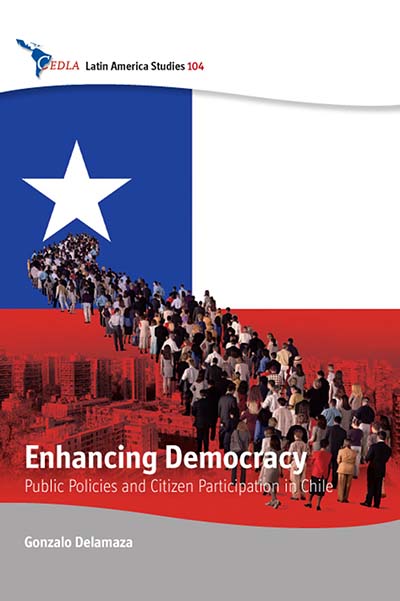 Volume 104 Forthcoming in November 2014!
Volume 104 Forthcoming in November 2014!
ENHANCING DEMOCRACY
Public Policies and Citizen Participation in Chile
Gonzalo Delamaza
Since the end of the Pinochet regime, Chilean public policy has sought to rebuild democratic governance in the country. This book examines the links between the state and civil society in Chile and the ways social policies have sought to ensure the inclusion of the poor in society and democracy. Although Chile has gained political stability and grown economically, the ability of social policies to expand democratic governance and participation has proved limited, and in fact such policies have become subordinate to an elitist model of democracy and resulted in a restrictive form of citizen participation.
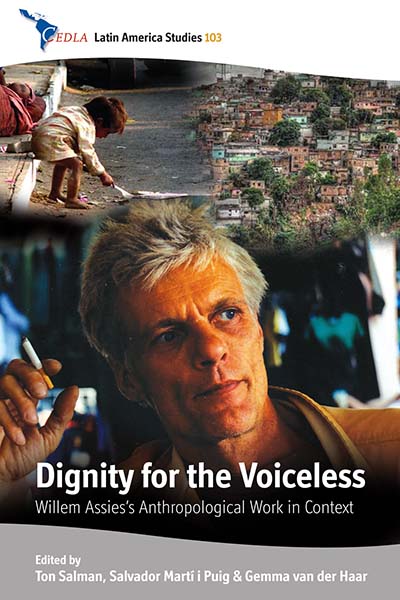 Volume 103
Volume 103
DIGNITY FOR THE VOICELESS
Willem Assies’s Anthropological Work in Context
Edited by Ton Salman, Salvador Marti i Puig, and Gemma van der Haar
Willem Assies died in 2010 at the age of 55. The various stages of his career as a political anthropologist of Latin American illustrate how astute a researcher he was. He had a keen eye for the contradictions he observed during his fieldwork but also enjoyed theoretical debate. A distrust of power led him not only to attempt to understand “people without voice” but to work alongside them so they could discover and find their own voice. Willem Assies explored the messy, often untidy daily lives of people, with their inconsistencies, irrationalities, and passions, but also with their hopes, sense of beauty, solidarity, and quest for dignity. This collection brings together some of Willem Assies’s best, most fascinating, and still highly relevant writings.
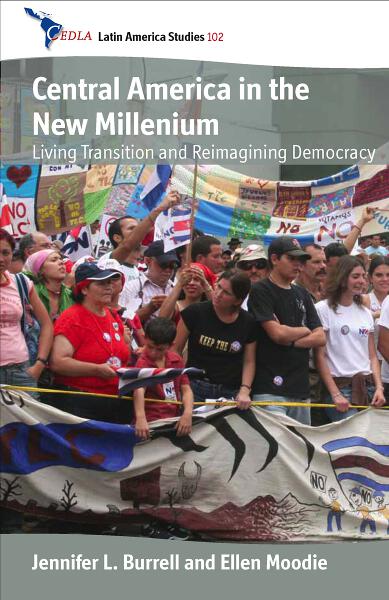 Volume 102
Volume 102
CENTRAL AMERICA IN THE NEW MILLENNIUM
Living Transition and Reimagining Democracy
Edited by Jennifer L. Burrell and Ellen Moodie
Most non-Central Americans think of the narrow neck between Mexico and Colombia in terms of dramatic past revolutions and lauded peace agreements, or sensational problems of gang violence and natural disasters. In this volume, the contributors examine regional circumstances within frames of democratization and neoliberalism, as they shape lived experiences of transition. The authors—anthropologists and social scientists from the United States, Europe, and Central America—argue that the process of regions and nations “disappearing” (being erased from geopolitical notice) is integral to upholding a new, post-Cold War world order—and that a new framework for examining political processes must be accessible, socially collaborative, and in dialogue with the lived processes of suffering and struggle engaged by people in Central America and the world in the name of democracy.
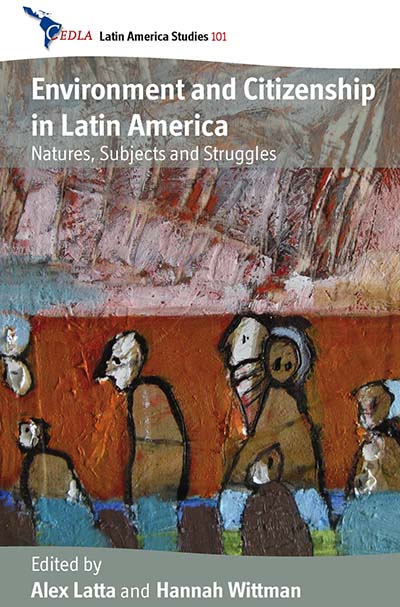 Volume 101
Volume 101
ENVIRONMENT AND CITIZENSHIP IN LATIN AMERICA
Natures, Subjects and Struggles
Edited by Alex Latta and Hannah Wittman
Scholarship related to environmental questions in Latin America has only recently begun to coalesce around citizenship as both an empirical site of inquiry and an analytical frame of reference. This has led to a series of new insights and perspectives, but few efforts have been made to bring these various approaches into a sustained conversation across different social, temporal and geographic contexts. This volume is the result of a collaborative endeavour to advance debates on environmental citizenship, while simultaneously and systematically addressing broader theoretical and methodological questions related to the particularities of studying environment and citizenship in Latin America. Providing a window onto leading scholarship in the field, the book also sets an ambitious agenda to spark further research.
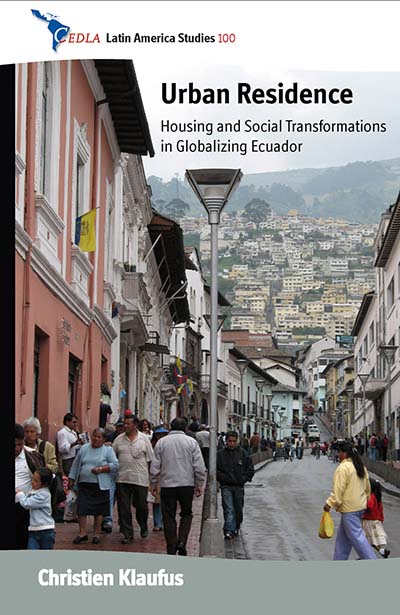 Volume 100
Volume 100
URBAN RESIDENCE
Housing and Social Transformations in Globalizing Ecuador
Christien Klaufus
Exploring the discourses and actions of two contrasting population groups, rarely studied in tandem, within these cities—popular-settlement residents and professionals in the planning and construction sector—this study analyzes how each is involved in house designs and neighborhood consolidation. Ideas, ambitions, and power relations come into play at every stage of the production and use of urban space, and as a result individual decisions about both house designs and the urban layout influence the development of the urban fabric. Knowledge about intermediate cities is crucial in order to understand current trends in the predominantly urban societies of Latin America, and this study is an example of needed interdisciplinary scholarship that contributes to the fields of urban studies, urban anthropology, sociology, and architecture.
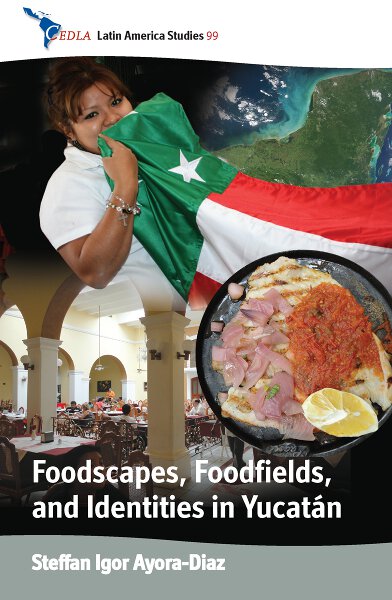 Volume 99
Volume 99
FOODSCAPES, FOODFIELDS, AND IDENTITIES IN THE YUCATÁN
Steffan Igor Ayora-Diaz
This book examines the politics surrounding regional cuisine, as the author argues that Yucatecan gastronomy has been created and promoted in an effort to affirm the identity of a regional people and to oppose the hegemonic force of central Mexican cultural icons and forms. In particular, Yucatecan gastronomy counters the homogenizing drive of a national cuisine based on dominant central Mexican appetencies and defies the image of Mexican national cuisine as rooted in indigenous traditions. Drawing on post-structural and postcolonial theory, the author proposes that Yucatecan gastronomy – having successfully gained a reputation as distinct and distant from ‘Mexican’ cuisine – is a bifurcation from regional culinary practices. However, the author warns, this leads to a double, paradoxical situation that divides the nation: while a national cuisine attempts to silence regional cultural diversity, the fissures in the project of a homogeneous regional identity are revealed.
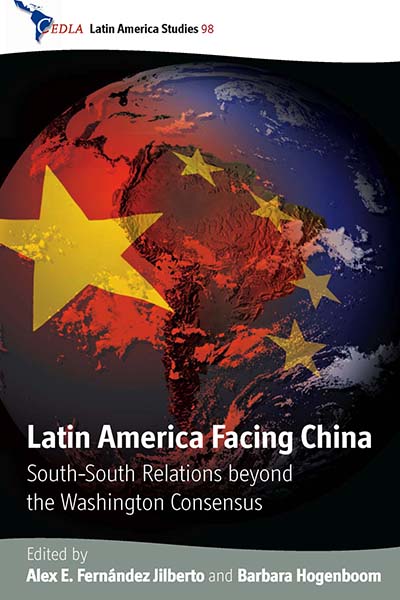 Volume 98
Volume 98
LATIN AMERICA FACING CHINA
South-South Relations beyond the Washington Consensus
Edited by Alex E. Fernández Jilberto† and Barbara Hogenboom
Based on several case studies, this volume assesses how China’s rise – one of the most important recent changes in the global economy – is affecting Latin America’s national politics, political economy and regional and international relations. Several Latin American countries benefit from China’s economic growth, and China’s new role in international politics has been helpful to many leftist governments’ efforts in Latin America to end the Washington Consensus. The contributors to this thought provoking volume examine these and the other causes, effects and prospects of Latin America’s experiences with China’s global expansion from a South – South perspective.
——————————————————————————————————————–
From Berghahn Journals:
 Regions and Cohesion
Regions and Cohesion
Regiones y Cohesión / Régions et Cohésion
The journal of the Consortium for Comparative Research on Regional Integration and Social Cohesion (RISC), a cross-regional, interdisciplinary, and multi-lingual network of socially conscious and prestigious research institutes in Europe, North America, South America, Africa, and Asia.
Due to the dramatic changes in global affairs related to regional integration, studies can no longer be limited to the analysis of economic competitiveness and political power in global geopolitics. Regions and Cohesion is a needed platform for academics and practitioners alike to disseminate both empirical research and normative analysis of topics related to human and environmental security, social cohesion, and governance. It covers themes, such as the management of strategic resources, environment and society, social risk and marginalization, disasters and policy responses, violence, war and urban security, the quality of democracy, development, public health, immigration, human rights, organized crime, and cross-border human security.
Interdisciplinary in nature and multi-lingual in character (English, French, Spanish), the journal promotes the comparative examination of the human and environmental impacts of various aspects of regional integration across geographic areas, time periods, and policy arenas.
